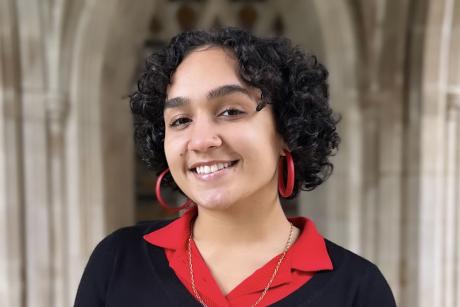Published April 1, 2008, last updated on March 4, 2013 under Research News
Maria Ines da Silva Barbosa, PhD, began her University Seminar on Global Health on April 1 by talking about a painting.
The painting showed four people: a dark-skinned grandmother, wearing typical clothing of a Brazilian domestic servant, and her mixed-blood daughter holding the fair-skinned child fathered by her white husband who was seated next to her . Barbosa said that this painting reflects the historical “racial project” of Brazil where the gradual “whitening” of the population was viewed by the country’s political and economic elite in the early 20th century as the most efficient path to reach European standards of civilization.
In a country that has 93 million blacks – more than half the population—anti-black racial discrimination is not easily seen, she explained. “We live very closely together; there was not official racial segregation in Brazil like there was in the U.S. or in South Africa, so white Brazilians have been able to say that they are not racist,” she said. But the facts lead Barbosa to a different conclusion.
Barbosa, who is the program coordinator of the United Nations Development Fund for Women, explained that despite the fact that the Brazilian constitution has guaranteed universal access to health care for all citizens since 1988, huge disparities still exist between blacks and whites:
- The average monthly household income is R$ 584.1 (about US $300) for whites, and R$ 276.1 (about US $142) for blacks.
- The percent of white women who receive no prenatal care is 1%, for blacks it is 5.4%
- The maternal mortality rate (death associated with giving birth) is 80% higher for black women than white women.
- In 2000, life expectancy at birth for whites was 74.61 years; for blacks it was 68.36 years.
“There is something stopping people from being able to take full advantage of free health care,” Barbosa declared. “It is racism.”
But Barbosa feels there may be reason to hope that things will improve. Since 2003, the Brazilian government has appointed a Secretary for the Promotion of Racial Equality. “In 2005, for the first time, the Health Minister publicly said, in a video, that there is racism in Brazil’s health system,” she said. That same year, Brazil participated in the World AIDS Day with its own emphasis on trying to reduce both AIDS and Racism. And since 2005, health education material and health campaigns have finally begun to use photos of blacks as well as whites.
There is much work still to do, said Dr. Barbosa, but “the debate about racism and health is now on the table instead of [hidden] in the kitchen.”
The University Seminar in Global Health series is co-sponsored by the Duke Global Health Institute and the Duke Center for International Studies.


